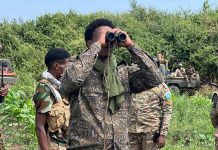
The head of the World Health Organization (WHO) has highlighted coverage of the Ukraine war to question whether the world “gives equal attention to black and white lives”.
Tedros Adhanom Ghebreyesus acknowledged the impact of Russia’s invasion was globally significant but said ongoing conflicts in his home country of Ethiopia, as well as Yemen, Afghanistan and Syria, had only garnered a fraction of the focus that has been placed on Ukraine.
He made the comments during a virtual press briefing from Geneva.
“I don’t know if the world really gives equal attention to Black and white lives,” he said.. “I said it last week, the whole attention to Ukraine is very important, of course, because it impacts the whole world. But even a fraction of it is not being given to Tigray, Yemen, Afghanistan, Syria and others.”
Last month, Tedros said there is ”nowhere on earth where the health of millions of people is more under threat” than Ethiopia’s Tigray region.
He also critiqued the press for its failure to document the ongoing atrocities in Ethiopia, noting that people had been burned alive in the region.
“I don’t even know if that was taken seriously by the media,” he said.
Tedros acknowledged that the war in Ukraine is globally significant, but asked if other crises are being accorded enough attention.
“And I need to be blunt and honest that the world is not treating the human race the same way,” he added on Wednesday.
“Some are more equal than others. And when I say this, it pains me. Because I see it.”
Tedros described the situation in Tigray as “tragic” and said he “hopes the world comes back to its senses and treats all human life equally.”
He also warned that now was “not the time to let our guard down” over the coronavirus pandemic.
The WHO chief was commenting on the conclusion of the WHO’s emergency committee on Covid-19 who on Wednesday unanimously affirmed that the virus remains a major public health danger.
“The situation is far from over with regard to the Covid-19 pandemic, the circulation of the virus is still very active, mortality remains high and the virus is evolving in an unpredictable way,” committee chair Didier Houssin warned.
“Now is not the time for relaxation on this virus, nor weakness in surveillance, testing and reporting, nor laxity in public and social health measures and no resignation when it comes to vaccination.”
The committee meets every three months to discuss the pandemic and reports to WHO chief Tedros Adhanom Ghebreyesus.
It concluded that the pandemic still constitutes a public health emergency of international concern (PHEIC), the highest level of alert that the WHO can sound.











